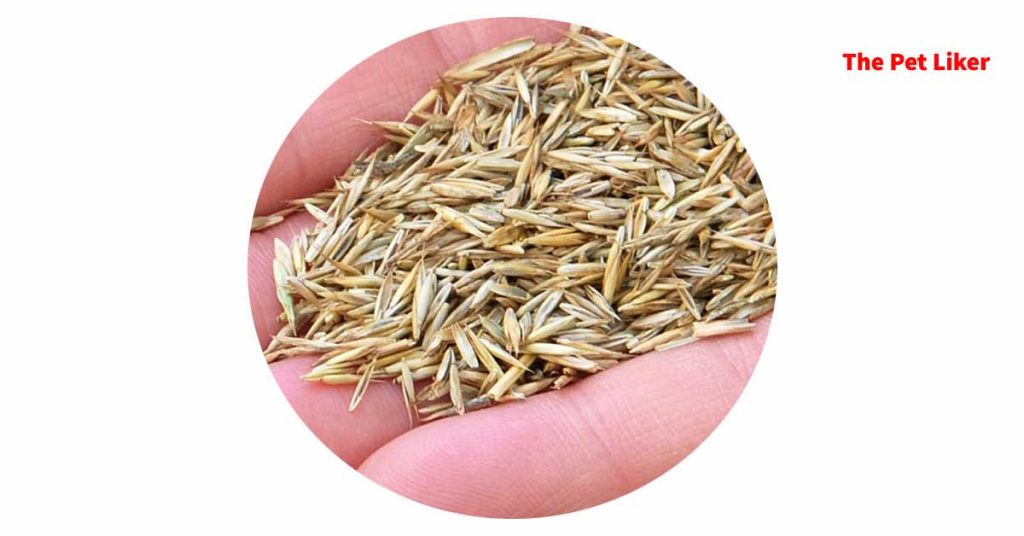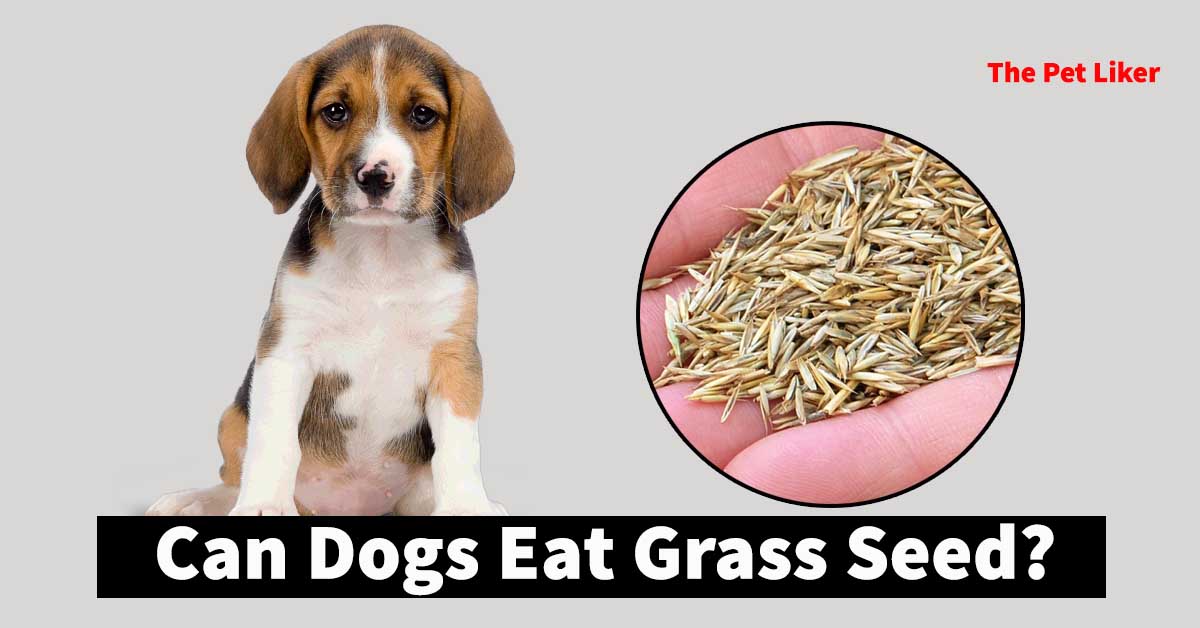Dogs are curious creatures, and it’s not uncommon to see them sniffing around in the grass, exploring their environment with their nose to the ground.
As a pet owner, you may have noticed your furry friend taking an interest in the grass and even trying to nibble on it from time to time.
While some dogs enjoy munching on grass, you may be wondering whether it’s safe for them to eat grass seed.
After all, you want to make sure your pup stays healthy and happy. So, can dogs eat grass seed? Let’s find out.
What is Grass Seed?
Grass seed refers to the reproductive material of grass plants that are used for planting and growing new grass. Grass seeds are typically small, dry, and hard, and come in a variety of shapes and sizes depending on the species of grass.
They can be bought in seed packets or in bulk and are commonly used for lawns, pastures, and other landscaping purposes. Grass seed contains all the genetic material needed to grow a new plant, including the embryo, endosperm, and seed coat.
Once planted and provided with the right conditions, the seed will germinate and sprout into a new blade of grass.

Can Dogs Eat Grass Seed?
While dogs can eat some types of grass, such as wheatgrass or oat grass, it is generally not recommended for dogs to eat grass seed.
Grass seeds can be hard and sharp, and if swallowed, they can potentially cause irritation or injury to a dog’s digestive system, throat, or mouth.
Some types of grass seeds, such as foxtail grass, can become embedded in a dog’s skin or soft tissues, leading to serious health issues.
If you notice your dog showing an interest in grass seed, it is best to redirect their attention to a more appropriate snack or activity.
If you are concerned about your dog’s behavior or health, consult with your veterinarian for further guidance.
Why Does My Dog Eat Grass Seed?
Dogs may eat grass seeds for a variety of reasons, including boredom, curiosity, or simply because they enjoy the taste or texture of the grass.
Some dogs may eat grass seed if they are not getting enough fiber in their diet, or if they are experiencing digestive issues, such as an upset stomach or constipation.
In some cases, eating grass seed may be a sign of an underlying medical condition, such as gastrointestinal problems, dental issues, or nutrient deficiencies.
Benefits ✅
While eating grass seed is generally not recommended for dogs, there are some potential benefits to dogs consuming certain types of grass, such as wheatgrass or oat grass. These benefits may include:
- Digestive aid: Grass contains fiber that can help promote healthy digestion in dogs. If your dog is experiencing mild digestive issues, consuming small amounts of grass may help relieve symptoms such as bloating or constipation.
- Nutritional value: Grass contains various vitamins and minerals, including vitamin A, vitamin E, vitamin K, iron, and calcium, which can provide some nutritional benefits to dogs. However, it’s important to note that dogs typically require a different balance of nutrients than humans and should consume a balanced diet specifically formulated for their needs.
- Natural behavior: Some dogs may simply enjoy eating grass or exploring their environment by nibbling on different plants. As long as the grass is non-toxic and not harmful to your dog, allowing them to engage in this natural behavior can provide mental stimulation and enrichment.
Risks ❌
While there are some potential benefits to dogs consuming certain types of grass, there are also some risks associated with eating grass, especially grass seed. These risks include:
- Digestive issues: Grass seed can be hard and sharp, and if swallowed, it can potentially cause irritation or injury to a dog’s digestive system, throat, or mouth. Eating large amounts of grass seed can also lead to gastrointestinal issues, including vomiting and diarrhea.
- Choking hazard: Depending on the size of the grass seed and the size of the dog, grass seed can pose a choking hazard if swallowed whole or in large pieces.
- Toxicity: Some types of grass or plants can be toxic to dogs if consumed, and even non-toxic grass may have been treated with pesticides or fertilizers that can be harmful to dogs. Additionally, grass seeds may be contaminated with harmful bacteria or parasites.
- Obstruction or perforation: If a dog eats grass seed that has sharp or pointed edges, it can potentially become lodged in their digestive system or cause perforation, which can be a serious and life-threatening condition.
Wrapping Up
Hope this article helps you to get a clear concept of your question “can dogs eat grass seed?”
While dogs may be curious about grass seed, it’s generally not recommended for them to eat it. Grass seeds can pose a choking hazard, cause digestive issues, and may be toxic or contaminated with harmful bacteria or parasites.
However, some types of grass, such as wheatgrass or oat grass, may provide some nutritional or digestive benefits to dogs when consumed in small amounts.
If you are concerned about your dog’s behavior or health, consult with your veterinarian for guidance on how to manage their diet and prevent any potential risks.
Thank you for reading! Always stay with The pet liker!! Have a nice day!!!
FAQ:
Here are some frequently asked questions related to dogs and grass seeds:
1. Can grass seed make my dog sick?
Yes, grass seeds can cause digestive issues in dogs, including vomiting and diarrhea. Additionally, some types of grass or plants can be toxic to dogs if consumed, and even non-toxic grass may have been treated with pesticides or fertilizers that can be harmful to dogs.
2. What should I do if my dog eats grass seed?
If your dog eats grass seed, monitor them closely and contact your veterinarian if you notice any symptoms of illness or discomfort, such as vomiting, diarrhea, lethargy, or loss of appetite.
3. Is it normal for dogs to eat grass seed?
While some dogs may be curious about grass seed, it’s not a necessary part of their diet and may pose a risk to their health if consumed in large amounts. Eating small amounts of grass may be normal behavior for some dogs.
4. How can I prevent my dog from eating grass seed?
To reduce the risk of your dog consuming grass seed, keep your lawn well-maintained and free of debris, supervise your dog when they are outside, and provide them with safe and appropriate toys and chews to chew on instead. If you notice your dog showing an interest in grass seed, redirect their attention to a more appropriate snack or activity.
5. Can dogs eat any type of grass?
While some types of grass, such as wheatgrass or oat grass, may provide some nutritional or digestive benefits to dogs when consumed in small amounts, it’s generally not recommended for dogs to eat grass. Some types of grass or plants can be toxic to dogs, and grass seeds can pose a risk to their health if consumed in large amounts.


Great line up. We will be linking to this great article on our site. Keep up the good writing.